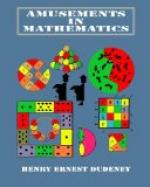We can place 2n-2 bishops on an n squared board in 2^{n} ways. (See No. 299, “Bishops in Convocation.”) For boards containing 2, 3, 4, 5, 6, 7, 8 squares, on a side there are respectively 1, 2, 3, 6, 10, 20, 36 fundamentally different arrangements. Where n is odd there are 2^{1/2(n-1)} such arrangements, each giving 4 by reversals and reflections, and 2^{n-3} — 2^{1/2(n-3)} giving 8. Where n is even there are 2^{1/2(n-2)}, each giving 4 by reversals and reflections, and 2^{n-3} - 2^{1/2(n-4)}, each giving 8.
We can place 1/2(n squared+1) knights on an n squared board without attack, when n is odd, in 1 fundamental way; and 1/2n squared knights on an n squared board, when n is even, in 1 fundamental way. In the first case we place all the knights on the same colour as the central square; in the second case we place them all on black, or all on white, squares.
THE TWO PIECES PROBLEM.
On a board of n squared squares, two queens, two rooks, two bishops, or two knights can always be placed, irrespective of attack or not, in 1/2(n^{4} - n squared) ways. The following formulae will show in how many of these ways the two pieces may be placed with attack and without:—
With Attack. Without Attack.
2 Queens 5n cubed — 6n squared + n 3n^{4} — 10n cubed + 9n squared — 2n
------------------- ------------------------------
3 6
2 Rooks n cubed — n squared n^{4} — 2n cubed + n squared
----------------------
2
2 Bishops 4n cubed — 6n squared + 2n 3n^{4} — 4n cubed + 3n squared — 2n
-------------------- -----------------------------
6 6
2 Knights 4n squared — 12n + 8 n^{4} — 9n squared + 24n
--------------------
2
(See No. 318, " Lion Hunting.”)
DYNAMICAL CHESS PUZZLES.
“Push on—keep
moving.”
THOS. MORTON: Cure for the Heartache.
320.—THE ROOK’S TOUR.
[Illustration:
+—–+—–+—–+—–+—–+—–+—–+—–+ | | | | | | | | | +—–+—–+—–+—–+—–+—–+—–+—–+ | | | | | | | | | +—–+—–+—–+—–+—–+—–+—–+—–+ | | | | | | | | | +—–+—–+—–+—–+—–+—–+—–+—–+ | | | | R | | | | | +—–+—–+—–+—–+—–+—–+—–+—–+ | | | | | | | | | +—–+—–+—–+—–+—–+—–+—–+—–+ | | | | | | | | | +—–+—–+—–+—–+—–+—–+—–+—–+ | | | | | | | | | +—–+—–+—–+—–+—–+—–+—–+—–+ | | | | | | | | | +—–+—–+—–+—–+—–+—–+—–+—–+
]
The puzzle is to move the single rook over the whole board, so that it shall visit every square of the board once, and only once, and end its tour on the square from which it starts. You have to do this in as few moves as possible, and unless you are very careful you will take just one move too many. Of course, a square is regarded equally as “visited” whether you merely pass over it or make it a stopping-place, and we will not quibble over the point whether the original square is actually visited twice. We will assume that it is not.




